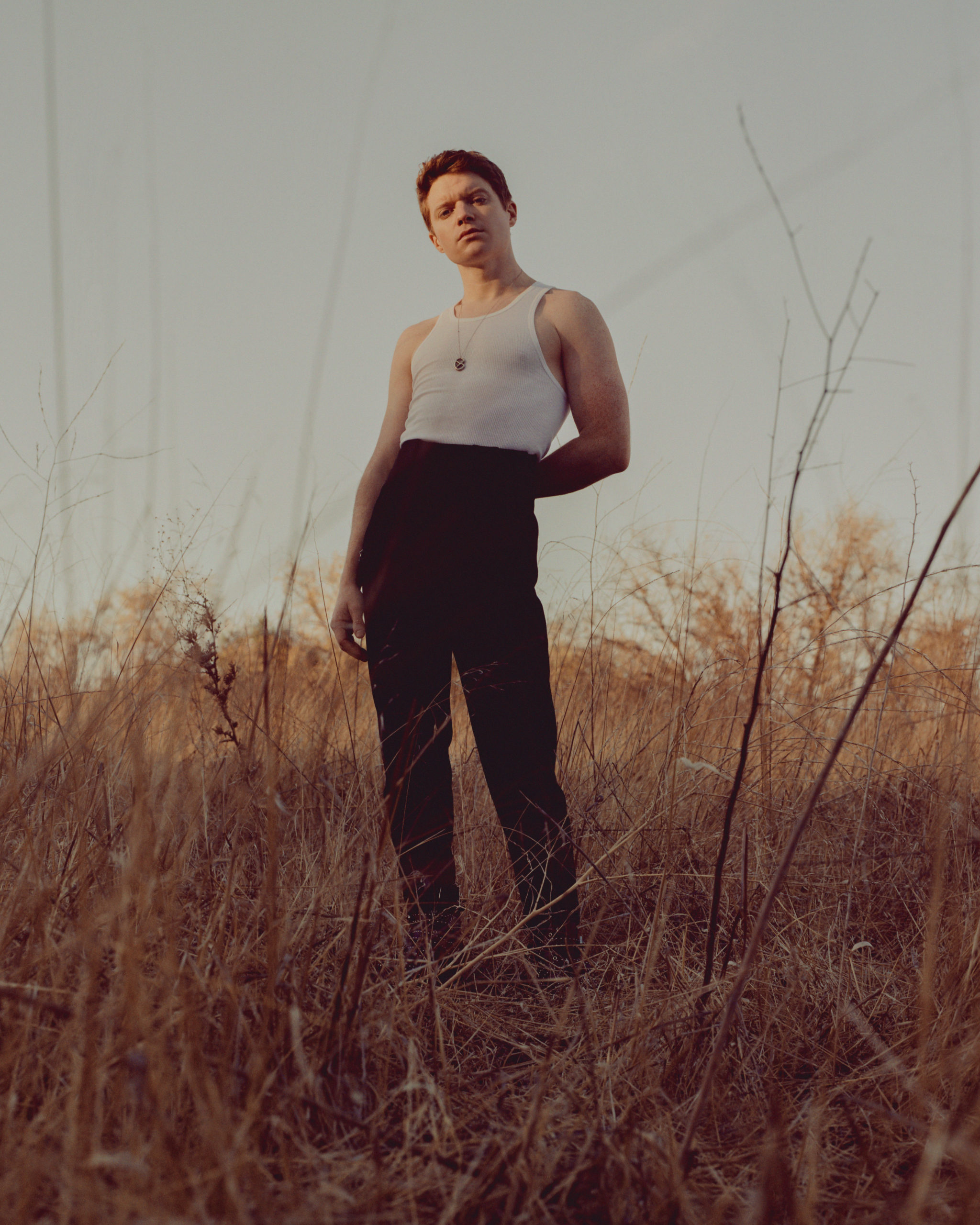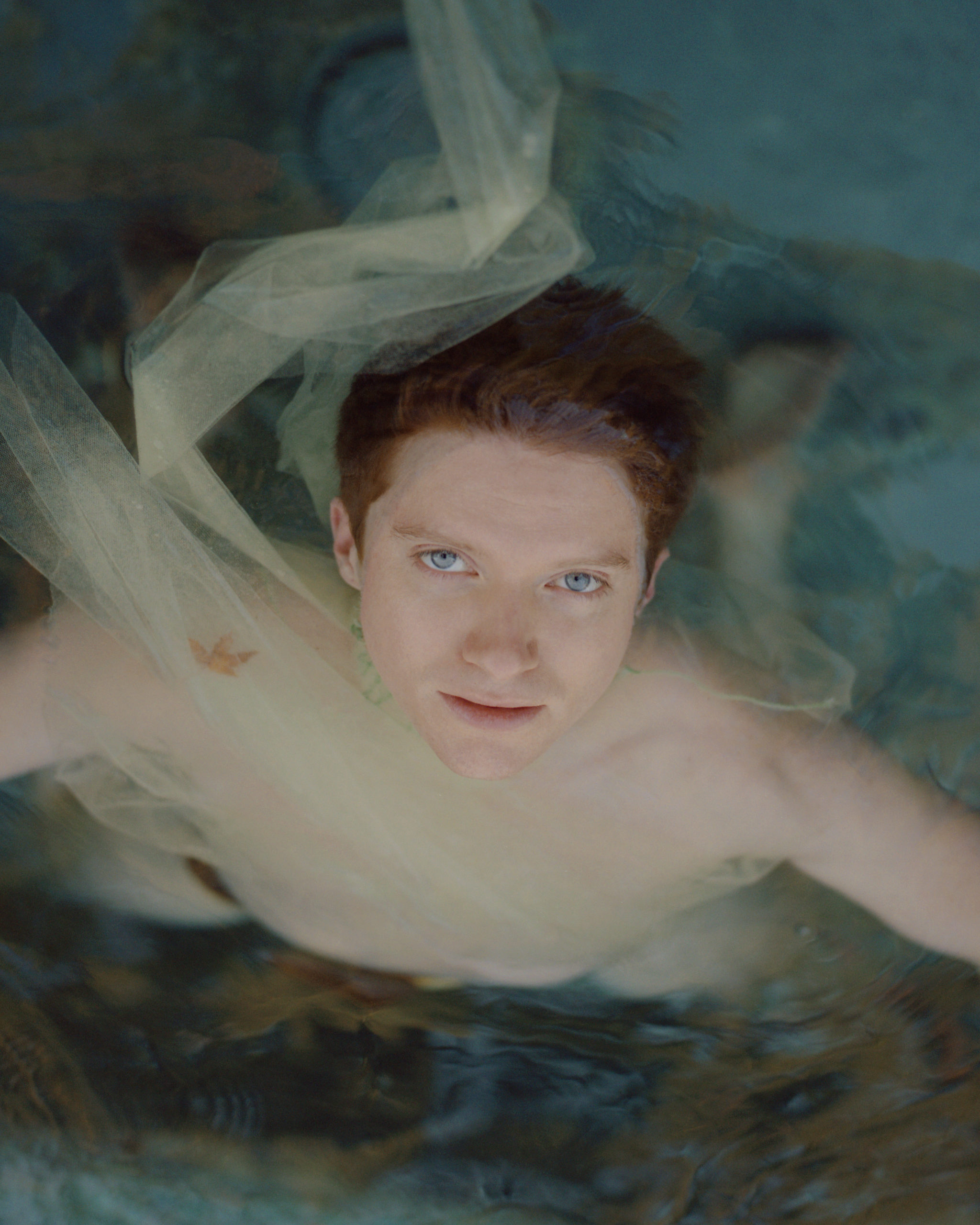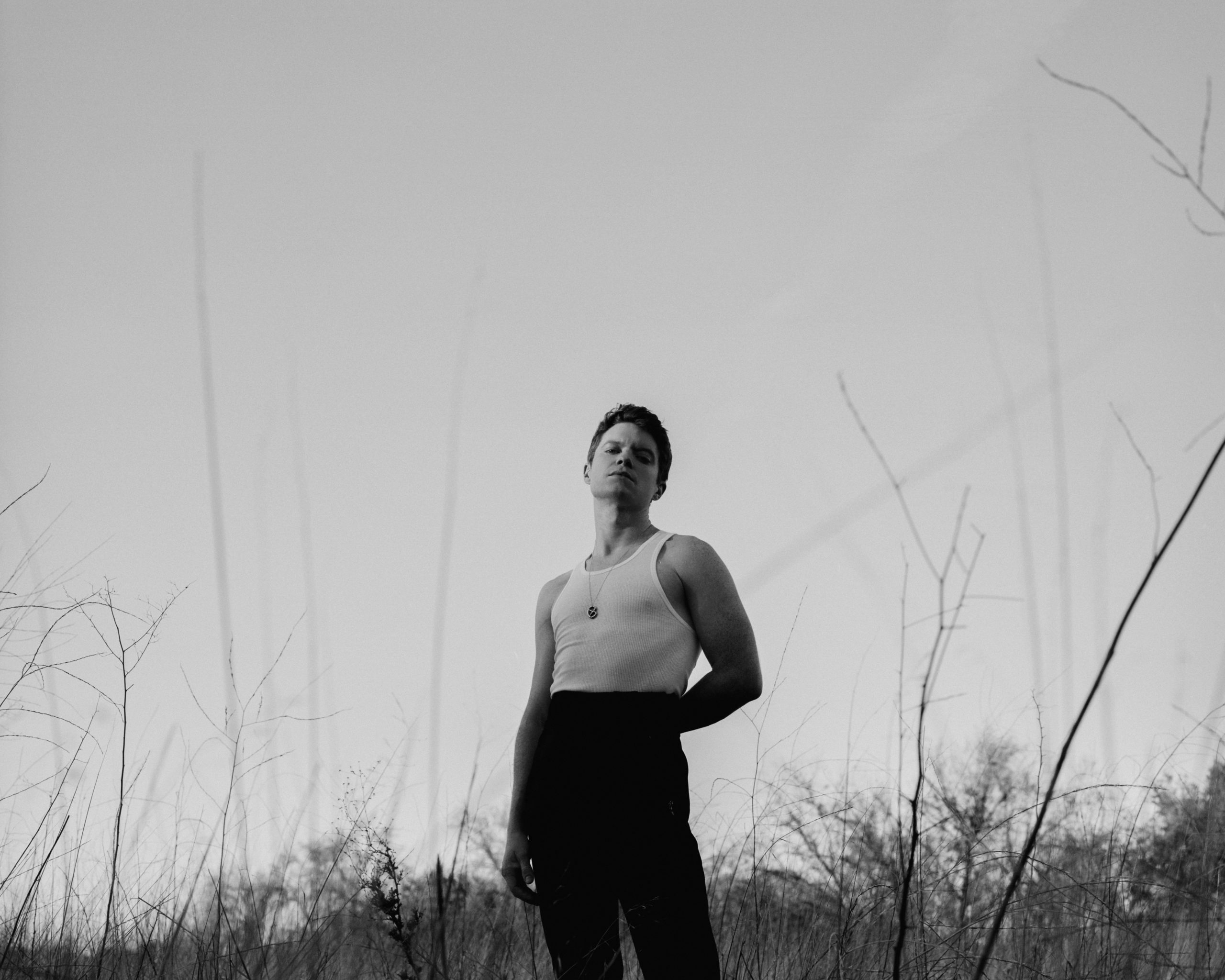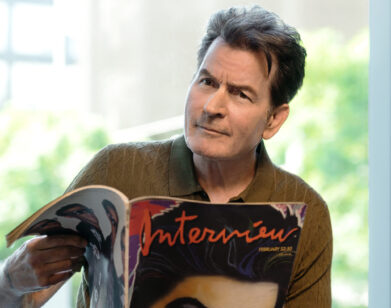in conversation
Brendan Scannell of Bonding Bonds With a Real-Life Bondage Rigger
The second season of Bonding, out now on Netflix, opens with Pete, played by the Los Angeles-by-way-of-Indiana actor, comedian, and writer Brendan Scannell casually licking his partner’s toes. The scene get at the core of Bonding, a dark, sexy comedy that approaches self-discovery through BDSM. The series might be the actor’s most daring work to date, not merely due to the kinky subject matter, but also because of the hilarious and intricate BDSM techniques he had to learn for the second season of the show. (Not to mention his mighty tight leather costumes, designed by New York’s fashion and fetish leather king David Samuel Menkes.) Bonding has become a cult darling of queer television, much like the actor’s previous work on the Paramount reboot of Heathers. A couple of days before the season two premiere of Bonding, the 30-year-old actor got on the phone with Olivia Troy, a well-known bondage rigger in the BDSM community for more than 15 years. She also happened to be Scannell’s intimacy coordinator on set and a writer on the show. The pair discussed how to choreograph a threesome on TV, the freedom of pushing one’s limits, and great feet.
———
BRENDAN SCANNELL: Hey, Troy.
OLIVIA TROY: Hi, Brendan. How do you feel?
SCANNELL: How are you?
TROY: I’m okay. I have a cold during COVID, which is kind of like, “Are you serious right now?” But here I am.
SCANNELL: I feel like being sick during COVID doesn’t make any sense. So, my first memory of meeting with you was that I came over to your studio in Manhattan because Pete has to learn a single-column tie in order to win back the good graces of the dom community, or at least get back into class. I obviously had no idea how to do that, so I came to you to learn.
TROY: It was great to have you there. That single column tie was something that got called out a lot in season one: “Oh, the rope bondage is not right.”
SCANNELL: At that point, you’d been working on the show for a while in a bunch of different hats, but for me, that was definitely my first day. I remember being like, “Oh, okay. We really upped the ante here.” Just the way the first season was done—so low budget. It was for this French streaming platform that of course is now defunct. Because it was so shot from the hip, to use a sports reference, we didn’t actually get to have any consultants, other than [the show’s writer] Rightor Doyle’s own personal experience. That was something that I was really excited about for the second season, feeling an added level of depth to the storylines and a new level of authenticity. We were able to, at least in reading the scripts, express that this isn’t just an insular story of two friends who happen to be a dominatrix and an assistant, but rather explore wider issues in the BDSM community, and tell a fun, heartfelt story about two friends and the people that come into their lives.
TROY: I was really excited to be invited in. When Doyle and I first started talking about it, I thought that he was just bringing me in to consult on the production, like the work that I had done for other television shows. Then when he said, “No, actually I want you in the writer’s room,” that was remarkable and completely unexpected for me. I think and I hope it turns out to be valuable for just how the community is represented in stories.
SCANNELL: You were actually the first intimacy coordinator that I’ve ever worked with. This show is not the first time I’ve ever been intimate on camera, but I didn’t realize how much of a relief it is as an actor to be working with somebody to choreograph a sex scene or to choreograph even a kiss, or a hookup, in a way that really just sets you free as an actor. A lot of times when you have a moment like that, you’re brought into a small room and the director is like, “So I guess I was kind of thinking of it would be like this, is that cool?” Us actors sort of look at each other and go, “Uh, yeah, I guess that’s cool.” Then you shoot it. That was not the experience on this, particularly with the threesome moment between Theo Stockman, Chris Perfetti, and my character. I felt so freed up knowing exactly what I was supposed to do.
TROY: I’m glad that I could be your first intimacy coordinator experience and I hope it was good for you. It was great for me. One of the things that really attracted me to the work of an intimacy coordinator was the idea of creating a safe space, a boundaried space, for actors to be vulnerable. I like to say that the vulnerability is in the performance, not in the production—and that’s something that I brought in from my experiences within the BDSM community. You know exactly what to do. That kind of power in an intimate scene is really affirming and powerful. It gives you a lot of creative latitudes.
SCANNELL: I think in our case with the specific intimacy moment with Chris and Theo and me, it was only one of a couple of days on set for Chris. I’ve been that actor before, where you come onto a set and it’s all really overwhelming. You’re meeting a lot of people. People are touching your face, they’re touching your hair, they’re putting clothes on you, they’re fiddling with a mic on your body and you can feel really like you have lost control of yourself. I almost like it, like I am a doll for a day, just being moved into positions.
TROY: It’s also kind of amazing to me that we have this show that, in many ways, other people sort of think like, “Oh, it’s such a sexy show, it’s so about sex or whatever.” There’s actually not that much sex in it.
SCANNELL: I know. I mean, there’s more sex in Bridgerton than there is in Bonding, I’ll say that. I think that’s one of the lines that the show straddles. It has these elements that can feel very sexy, or have a big hook to them. But ultimately, it’s a tiny story, and it’s about people either butting up against their own vulnerabilities, embracing them, or trying to protect themselves. Pete in the second season is experiencing this sort of newfound career confidence with standup, and he’s got his swagger. In his relationship with Tiff [played by Zoe Levin], he’s starting to feel more and more judged, and sort of vulnerable to this person with whom he’s always been so intimate and close.
TROY: In some ways, Pete is becoming a dom himself, in the way that he dominates the stage and is dominating his profession, as a comedian.
SCANNELL: That’s what I was excited about. When I was reading the scripts I felt like the first season for Pete, he is on this journey in order to be comfortable with himself and his own body, to get a sense of himself. Then the second season, he’s seeing how far he can push himself and how far he’s focusing on himself.
TROY: He is actually finding his own light and finding his own shine and purpose and identity and power and really thinking about what he wants for himself. I think like even in real life, when anybody does that, it’s just like, “I don’t have to just do what everybody thinks I should do, or do what’s expected of me.” It’s very empowering and there’s nothing selfish about it. It’s something that everybody should go through.
SCANNELL: I was a bit nervous about the first season coming out, because of this subject matter with my parents. Now they’ve watched it in basically every language on Netflix. My aunts and uncles have watched it and it’s sort of this world that, as far as I know, a lot of them were completely unfamiliar with, outside of other representations in media. Now, they’re hooked on it and excited about it. That’s why one part of the second season explores other elements of BDSM, like the fetish elements of it. I’m just excited to hear their responses, and from others outside of the queer world, and the leather world.
TROY: One of the things Rightor and I have talked about is that Bonding is on Netflix. It is not on Pornhub. It’s sort of odd that we can talk about murder and violence and nobody blinks an eye, but if you say, “Oh, but my character had a three-way kiss,” all of a sudden, everybody has to clutch their pearls. I love that Bonding is just bringing that conversation to the front. BDSM is fun and sex is fun.
SCANNELL: I feel like what drew me to the show was the sensitivity, and also that it made me feel dangerous. Because it was fun. It was funny. It was heartfelt. But there was also an element of it that really scared me.
TROY: What was it that scared you?
SCANNELL: I think I was scared about dressing up in leather and doing all these things I had never done before, and being the face of something. Despite my profession, I’m very private and anxious about these releases. But actually, this season, I feel almost more at peace than I’ve ever felt during a release of anything I’d done. I think a lot of that is because of the work you did, the prep that Doyle did and I just felt really comfortable on set and at home. Obviously, I would love to do it again.
TROY: Some of that, I imagine, is because by the time you got to season two, it’s like, “Oh yeah. I like my leather to fit me this way.” Or, “Oh, I know how to crack a whip.”
SCANNELL: Right. That was so cool to get my leather custom-made. I think it was David Menkes who made it.
TROY: He is a legendary leatherman in New York City. He was dressing all the leather daddies back in the day, and still has a great shop on Fifth Avenue and in Union Square. He is phenomenal.
SCANNELL: You walk into a space like that in New York and you’re like, “Wow, just the history of the workspace, in terms of all the different things that have been made, where those things have been worn, the gay history of it.”
TROY: Every time I go to David’s shop, I always have to remind myself to set aside an extra 45 minutes to just sit and chat with him, because he always has so many great stories. He has seen and done so much.
SCANNELL: I think that there is a certain de-stigmatization that the show can help serve in that way, especially when it’s done the way that I think season two was done.
TROY: Having that better representation and being able to help creatives tell more stories about underrepresented people in television and film—when that is happening, the people and the characters and stories that we’re telling are recognizable and they’re authentic. This stuff is sensitive and because we tend to pretend that society is monolithic, but it is not. It is multifaceted. It’s sort of in the same way that every group of friends who live together in New York City are not the cast of Sex in the City and are not Friends. There are myriad experiences of what it looks like to be young and single in New York City.
SCANNELL: Then there are just so many different fun, diverse, wild, kink moments in the show. I think the most fun day of shooting for me was when we did that montage at the beginning of, I think, episode two. I got to do a scene where I’m in a straitjacket, which coincidentally was the day that my mom was there. And the puppy play day. We got to do the dildos, which was so fun. Then the furry, the penguin, it’s funny. That’s always a gag for me.
TROY: There are a couple of significant heavy leather bondage scenes that happen in this show, and I remember at the end of one of the days just sort of asking some of my friends, “When have you seen bondage, real bondage, in a television show?” For the most part, people said that they only see BDSM on TV when it’s happening as a form of torture.
MACIAS: You’re right, there are not many shows that open up the season with someone licking someone’s foot.
SCANNELL: Theo’s got some great feet.
———
Grooming: Sonia Lee










